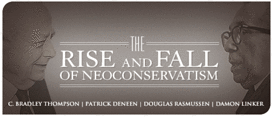In his reaction essay, “Strauss and National Greatness,” Damon Linker makes the following claim:
The Aristotelian outlook that shapes neocon thinking (by way of Strauss’s influence) is nowhere near as sinister or radical as Thompson would have us believe. It may well be wrong—unsuitable for understanding political life in modern, highly differentiated societies. But that doesn’t make it threatening.
This may be so. It depends on to what one is comparing the Aristotelian outlook. But if, as I noted in my reaction essay, “Neoconservatism, Leo Strauss, and the Foundations for Liberty,” the Aristotelian outlook is guilty of not differentiating between the function of societies or communities and that of the state, because its basic term of analysis—polis—conflates society or community with state, then there is a basic problem in the Straussian neoconservative approach to politics. This approach simply assumes that whatever is good, worthwhile, or indeed perfective of human well-being is in principle the aim of the state. This form of political theorizing slides without argument from politics qua social or community to politics qua state, and it leads to “The Perfectionist Approach to Politics.” To wit:
A) Politics is concerned with the promotion of human flourishing or well being.
B) Human flourishing or well being consists in the development and/or use of certain human capabilities.
C) A given capability, call it X, is an example of something necessary for human flourishing or well being.
Therefore, this X must be politically secured.
There is much debate about premise B. Such tough questions as: “What is involved in the lists of capabilities whose development constitutes human flourishing?” and “How does one validate such lists?” Further, there is much debate about what laws and government policies best secure a given capability as well as how to pay for such policies. It is especially in regard to this latter issue that most political debates takes place. Yet there is an important question that only a few have noted—namely, “What is the basis for premise A? The Straussian neoconservatives, as well as many contemporary “liberals,” simply assume that premise A is true, but they offer no argument on its behalf.
Nevertheless, what is it that legitimates a political/legal order? What is the nature of the connection between the ethical order and the political/legal order? There is a prima facie difference between claiming (i) that doing M is good or right (bad or wrong) and ought to be done (ought not to be done) and claiming (ii) that doing M ought to be politically/legally required (prohibited). These claims are not semantically equal, and (i) does not, by itself, imply (ii). Or, as Aquinas suggests: there are demands of justice that are morally binding and there are demands of justice that are morally and legally binding. Indeed, the datum explanandum of political philosophy is what, if anything, entitles one to move from the ethical to the political—from (i) to (ii). What is it that connects these two claims?
One begs the question if one simply assumes that the aim of the political/legal order is soulcraft. There are alternatives. Most importantly, there is the idea that defines the American political tradition—namely, establishing a political regime that secures individual rights.
When libertarians or classical liberals are drawn into debates in political philosophy with those on the left or the right, it is often done in a context in which premise A is just assumed. This is like fighting with one arm tied behind one’s back. This argumentative arena is in large part due to the heritage that the Aristotelian outlook provides for politics. Such an arena is dangerous for liberty.

